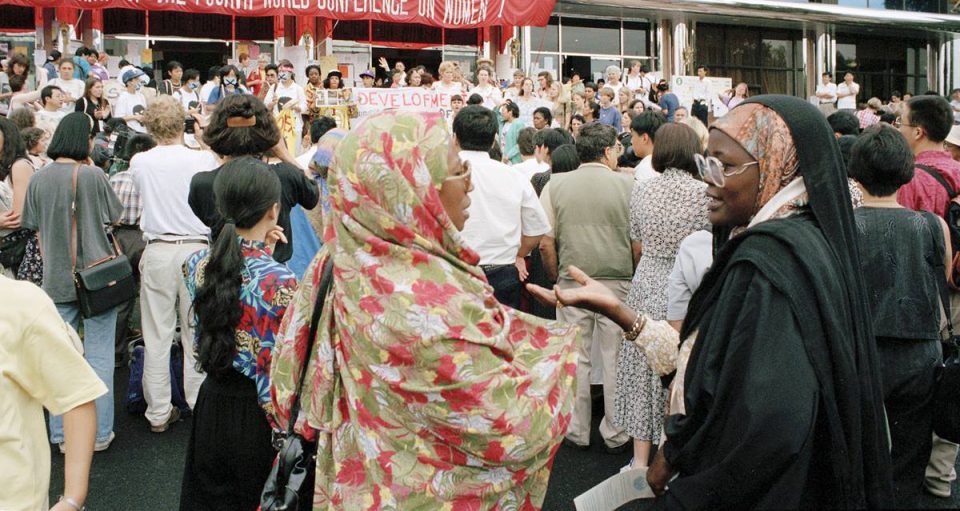The 1995 Beijing World Conference on Women marked a significant turning-point in achieving the global goal of gender equality.
Women across the world view the conference as an eye opener to starting agitation for an increase inclusion of women in the scheme of things, especially public offices.
Organised by the United Nations, no fewer than 189 UN member states unanimously adopted the resolution of the conference as a global agenda for ensuring the improvement of human rights for women and girls.
In spite of the resolution, critics note that Nigeria, being a signatory to the resolution, has not been living up to the expectations of the womenfolk in that regard.
So, in 2019, the National Council of Women Societies (NCWS), began series of advocacy to educate and encourage women participation in politics.
NCWS President Gloria Shoda identifies mentorship for women to get them interested in politics and getting public offices.
She notes that there are 29 female legislators in the 2015-2019 National Assembly which formed six per cent.
She says the present National Assembly has 18 female lawmakers — 3.8 per cent – a decline in female number.
“With this decline, it shows that women voices, perceptions and experiences will be missing during parliamentary debates.
“The state houses of assembly fare no better; most of them have no female members or at best, only a handful,’’ she said.
Shoda observes that since 1999, when Nigeria returned to democratic governance after years of military rule, no woman has been elected as president, vice-president or governor in any of the country’s 36 states.
“Women have been playing subordinate roles and have not been independent political actors; the deep gender gap in Nigeria national and sub-national legislature calls for urgent action.
“It is in recognition of the existing gap that the National Policy on Women was formulated in 2000 and later replaced by the National Gender Policy in 2006, which calls for affirmative action for the greater inclusion of women in politics,’’ she said.
Gender activists also note that the Gender and Equal Opportunity Bill aimed to tackle all forms of discrimination against women and promote gender equality in politics, education, employment, marriage, and inheritance, was also stalled in the parliament since it was introduced in 2010.
Shoda notes that in spite of these key measures, progress for an all inclusive governance has been slow.
She says that most democracies were striving towards good governance and one of the key pillars of good governance is inclusion.
She insists that active women’s participation in politics will drag until the present government and policy makers stir up women interest and provide fair process of integrating them in issues that concern governance.
According to her, the NCWS will ensure that women who are presently holding public positions across the country would serve as torchbearers for other female politicians.
She also says that mentorship scheme will serve as platforms to build capacity of aspiring female political leaders in the society to ensure that they get into political space.
As an umbrella body of women, we will continue to liaise with other women groups to build mass coalition of women support and advocacy group for women.
She recalls that NCWS has trained gender officers from the 774 local government areas across the country to educate women on the need to be political sensitive.
Irrespective of Shoda’s plea, Mr Chukwuemeka Nwajuiba, the Minister of State for Education, enjoins Nigeria women to speak with one voice to achieve the feat.
According to him, women must strategically position themselves as team players in nation building to achieve the goal of inclusion in governance and policy formulation.
“We must master the art of being another woman’s keeper; we must consistently speak with one strong voice and challenge ourselves and continuously build on our capacity.
“To transform our education sector, all hands must be on deck. Inclusion is key; we must individually choose our roles either as the visionaries, the enablers or the actual implementers of the next level which we would like to see,’’ he says.
Nwajuiba notes that it is commendable when a coalition of women take charge to bring key players together to further empower women on their roles in enhancing inclusion to impact on the education sector.
“It is no longer news that President Muhammadu Buhari-led government is determined to provide all-inclusive, equitable education for all girl-child, boy-child, drop-out, the Amajiri and out-of-school children being our agenda and top on the priority list of our ministry’’, he says.
Concerned citizens, nonetheless, insist that the will to change the narrative lies in the interest of the government, policy makers and individuals.




